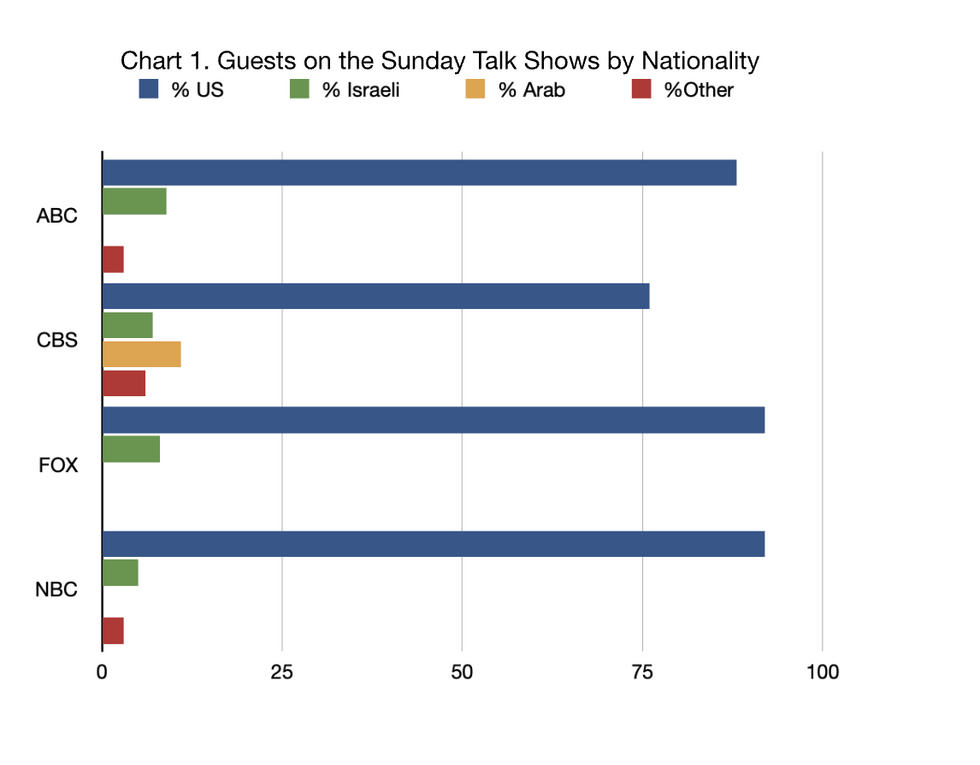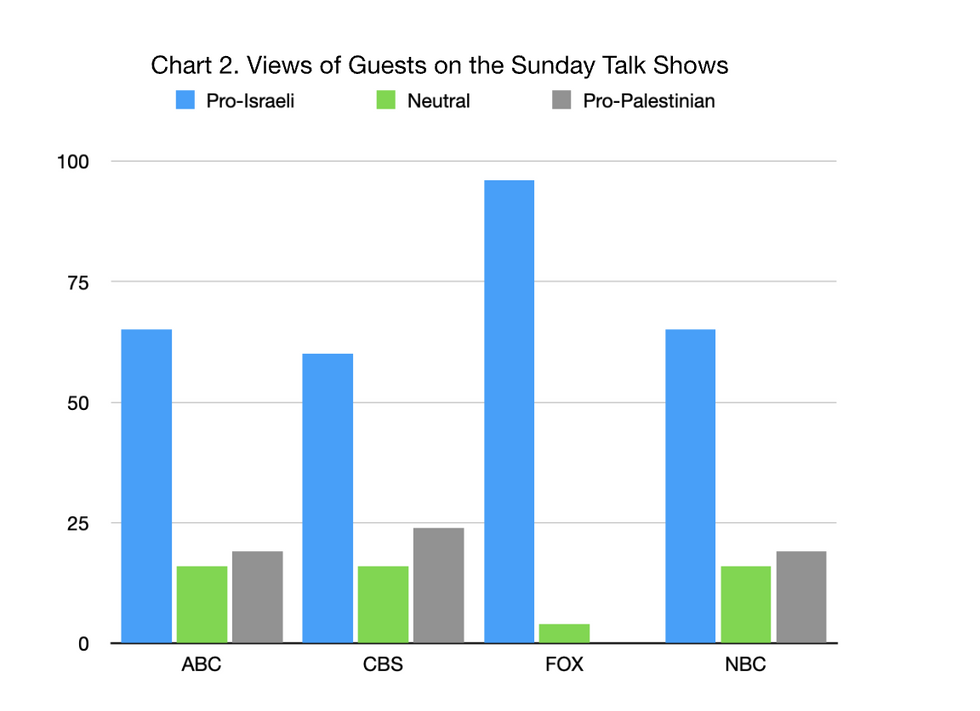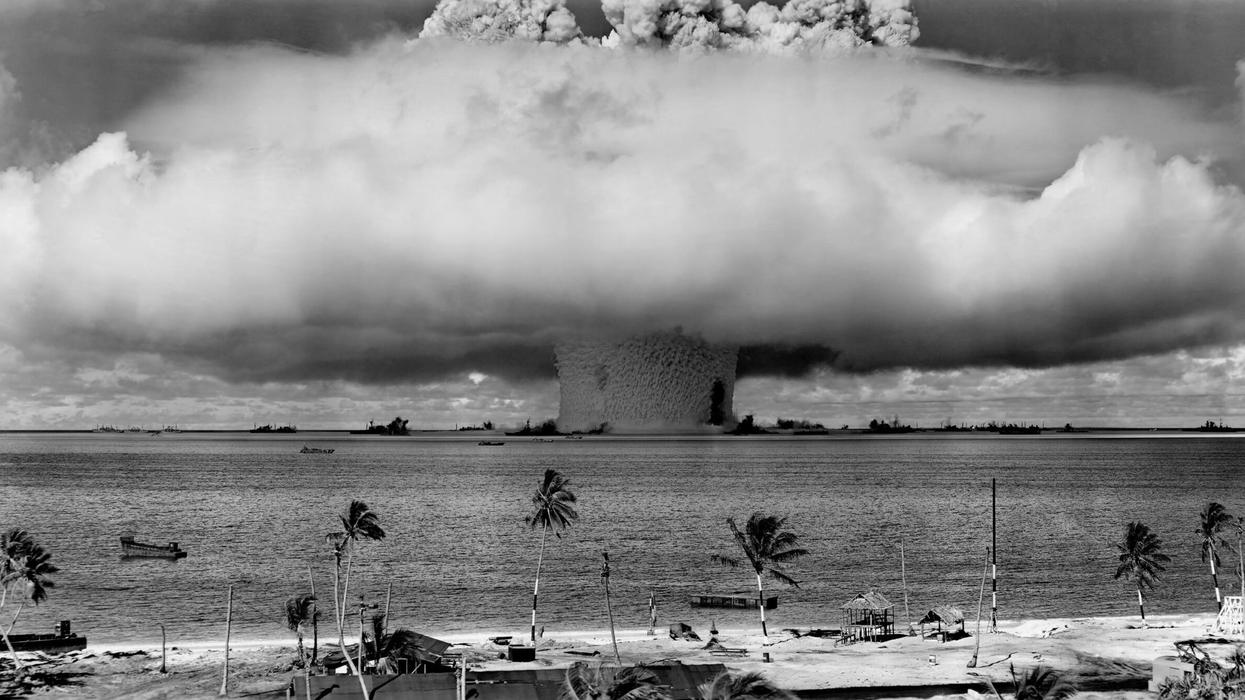Traditionally, the most important platforms for political analysis on television in the United States have been the Sunday morning news talk shows on the major networks—NBC, CBS, ABC, and Fox.
The staple feature of the talk show format is the interviews with guests, who include newsmakers, prominent individuals, and current and former officials, followed by news roundtables or panels featuring officials, journalists and experts. How they discuss the issues of the day reflects the priorities and biases of the political elite, which risks leaving audiences uninformed and unexposed to a range of views in the world.
When it comes to Gaza, these shows illustrate just how one-sided and detached are America’s leading policymakers and media.
The shows’ names are most familiar to middle-aged and older Americans: Meet the Press (NBC), Face the Nation (CBS), This Week (ABC) and Fox News Sunday (FOX). These shows are not as dominant as they once were, but they still command relatively high ratings, ranging from the 908,000 viewers of Fox News Sunday to the 2.78 million viewers of Meet the Press in September, 2023.
This writer carried out an analysis of the shows’ guests and their remarks during the three months immediately following the Hamas attacks of October 7. The database Nexus Uni and the programs’ websites provided transcripts from the episodes from October 8 to January 14.
After removing episodes that did not discuss Gaza beyond a brief mention, there were 51 transcripts to analyze. In these transcripts, there were 140 guests, defined as “outside” or invited interviewees and panelists (removing from the analysis those guests employed by the networks as reporters or analysts as well as interviewees in the edited packages). Data were collected on these 140 guests regarding their national affiliation, employer, and job title, and their remarks were ranked on a scale from pro-Israeli to neutral to pro-Palestinian.
Finally, the frequency of particular key words was gauged — such as “hostages,” “occupation,” and “ceasefire,” among others.
Findings
The overwhelming majority of guests—120 out of 140—were American. Most notably, not one of the American guests were of Palestinian heritage or even Arab-American. Three American guests were of South Asian Muslim heritage, but only two of them expressed pro-Palestinian views. The third works for a conservative think tank and was far more sympathetic to Israel in his comments than the other two.
Israelis made up the second most common nationality, 10 total guest appearances, representing only 7 percent of the total (see chart 1). Only one program, CBS’s Face the Nation, had any Arab nationals as guests, but they were relatively well represented on that show, making up 11 percent of all the guests who appeared. Notably, only one Palestinian national was a guest. Hussam Zomlot, the head of the Palestinian Mission to the United Kingdom was on Face the Nation in November, 2023.

The views expressed by American interviewees and panelists were overwhelmingly pro-Israel. These guests were more than twice as likely to sympathize with Israel than with the Palestinians. As chart 2 shows, there was some variation worth noting. Fox News Sunday was an outlier with a whopping 96 percent of guests expressing pro-Israel views; there was not a single pro-Palestinian view expressed.
On the other programs between 60 and 65 percent of guests expressed pro-Israel views. In sum, pro-Israeli views were almost five times as frequent as pro-Palestinian on all the aired programs.
One systematic problem with these shows is that they overrepresent the views of a narrow band of the political elite in the United States. Eighty-two percent of guests (115 out of 140) on the Sunday news shows analyzed for this article were current or former US government officials. Given the lopsided nature of U.S. foreign policy as resolutely pro-Israel, it is expected that framing in these talk shows would disproportionately reflect that position, even though Israeli guests were a small percentage of those who appeared.

Bias in Framing
Due to the biases in U.S. foreign policy and the paucity of Palestinian and Arab perspectives, the key contexts that identify deep problems with Israeli policies were nearly absent. For example, “occupation” was mentioned only 15 times in the 51 hour-long programs analyzed, and it was mostly the Arab guests who did so.
By contrast, guests uttered the word “hostages” 529 times, a ratio of 35 mentions to one mention of “occupation.” The Israeli hostages in Gaza were brought up ten times per program on average. Hamas and other groups declared that they took hostages in part to secure the release of Palestinian prisoners, many of whom Israel holds without charge. Yet, Palestinian prisoners were mentioned only 17 times. Israel’s holding of Palestinian prisoners is of course a function of its military occupation.
One surprising finding was how few guests talked about “Palestinians” at all. As a baseline, guests mentioned Israel 2,282 times. Hamas was brought up half as frequently (1,108 times). Yet, Palestine or Palestinians — who have borne the brunt of Israel’s war on Gaza — merited only 456 mentions, less than half as often as Hamas. This signifies a preferred framing of the war as a conflict between Israel and Hamas, which distracts from Israel’s systematic punishment of Palestinian civilians.
Another framing pattern concerns how to end the Gaza crisis. Despite “ceasefire” being the prevailing demand of a vibrant U.S. protest movement, including a growing number of U.S. lawmakers and many world leaders, it was hardly discussed. “Ceasefire” was brought up only 94 times on all the shows. More than half of these mentions were on Fox News Sunday, where guests roundly opposed the idea.
Even more scarce than “ceasefire” was the term “genocide,” which was uttered by guests just 23 times. And only once was it applied to Israel’s conduct in Gaza, despite its widespread consideration by scholars, international lawyers and governments, in relation to Israel’s siege and bombardments of Gaza. Notably, the International Court of Justice (ICJ) found South Africa’s complaint of genocide plausible in at January ruling.
The lone appearance of “genocide” in relation to Gaza came when when the host of one show read a social media post by Rep. Rashida Tlaib (D-MI) regarding the ICJ case. But the overwhelming majority — 20 of the mentions total — repeated the erroneous claim that American university campus protest slogans are calls for genocide against Jews.
Conclusion
Given the strongly pro-Israel tilt in U.S. foreign policy, many will not find these results surprising. This study documents the extent to which that bias manifested and it is overwhelming.
That the Sunday news shows on ABC, NBC, and FOX failed to include a single Palestinian guest (while CBS only had one) is an astounding failure. Yet, no data point should be as worrisome as the fact that officials in the Biden administration and Democratic lawmakers were among the main producers of pro-Israel messaging that did not take into account — at all — realities on the ground in Gaza or potential war crimes, if not genocide, being committed in Gaza today.
















